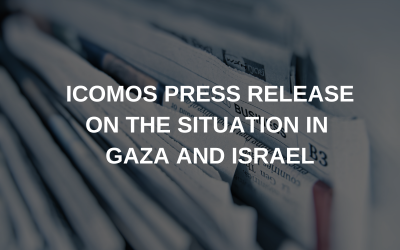ICOMOS Press Release on the Situation in Gaza and Israel
 Following ICOMOS’ appeal on 17 October, and in the face of the increasingly distressing developments over the last months, ICOMOS again expresses its sadness and horror at the unacceptable and unconscionable price being paid by civilians, in particular children, and at the destruction of cultural, archaeological and living heritage, since the present round of this conflict began over two months ago.
Following ICOMOS’ appeal on 17 October, and in the face of the increasingly distressing developments over the last months, ICOMOS again expresses its sadness and horror at the unacceptable and unconscionable price being paid by civilians, in particular children, and at the destruction of cultural, archaeological and living heritage, since the present round of this conflict began over two months ago.
Cultural heritage not only plays a central role in the history of this ongoing conflict but also serves as a source of social cohesion and humanitarian values, and gives people a sense of place, belonging and identity. The heritage of Gaza, with its over 3000-year history as a strategic crossroads of civilisations, whose traces – religious buildings, historic buildings, museums, archaeological sites, traditional neighbourhoods – can be found throughout the Strip but especially in and around the densely urbanised Gaza City in the northern part, has suffered irreversible damages – and every further day of fighting puts it at greater risk. Among others, reports are available on the destruction of the 7th century Great Omari Mosque and airstrikes within the compound of the 5th century Church of St. Porphyrius. Furthermore, mass population displacement and destruction of homes and neighbourhoods will have an incalculable impact on the living culture and intangible heritage of the Palestinians.
ICOMOS again calls on all parties to do all in their power to protect cultural heritage and to respect to the letter and the spirit their obligations under international law, both treaty and customary – and in particular the 1954 Hague Convention for the Protection of Cultural Property in the Event of Armed Conflict and its two protocols, the 1972 World Heritage Convention and the 2003 Convention for the Safeguarding of the Intangible Cultural Heritage. ICOMOS reminds and stresses that the intentional targeting of cultural and religious sites (that are not legitimate military objectives and have no imperative military necessity), as other civilian objects, is prohibited specifically, under any circumstances, in international humanitarian law and is considered a war crime.
ICOMOS is in constant contact with its colleagues in both Israel and Palestine. Our International Scientific Committee on Risk Preparedness (ICORP) and its Crisis Monitoring and Response Working Group are tracking developments, gathering information on impacts to cultural heritage and preparing strategic response and recovery activities.
ICOMOS welcomes the UN General Assembly resolution A/ES-10/L.27 adopted on 12 December 2023, demanding an immediate humanitarian ceasefire, the immediate and unconditional release of all hostages, as well as ensuring humanitarian access to Gaza. ICOMOS urges all parties involved to work toward a sustainable cessation of hostilities.
ICOMOS offers its scientific and technical assistance and cooperation to all those working to protect the heritage in the region and towards paths which embrace dialogue, mutual respect and dignity for the people and their shared cultural heritage – as an indispensable element to rebuilding peace. As always, our thoughts remain foremost with our colleagues in both ICOMOS Israel and ICOMOS Palestine, and their families.![]() Read the full press release in English / Spanish
Read the full press release in English / Spanish
